Introduction
In most developing countries, it is evident that traffic fatalities are common. Road fatalities are among the top roots of accidents, being the sixth cause of death worldwide (Shaaban, 2017). In the UAE, traffic crashes have become a rampant problem affecting most road users. On the other hand, the United Arab Emirates (UAE) has been in a position of achieving development at every level since the early 1980s. This includes all its sectors within the economy as well as the urban centers. However, the significant change was realized through the enlarged population and, at the same time, the increase in the number of vehicles moving around the emirate. This has been achieved through economic development and increases in employment opportunities across the country. On the other hand, this has amplified the traffic problems, especially among most road users in the UAE. Road accidents have affected every road user, including the driver and pedestrian, being the leading cause of death.
To ensure that the country is handling augmented traffic crashes, it has introduced road safety measures that everyone should observe. Among the strategies that the UAE has used to enhance road safety, road policing, traffic enforcement, and other, associated penalties are essential. The efforts have yielded positive results for the country, and the relevant authorities are working to ensure road safety is a priority. Everyone has an obligation to follow the set of regulations regarding road use. The major goal of the government is to ensure that fatalities from road accidents are reduced. Therefore, the research will examine the opinions of road users about traffic fines and penalties effectiveness in the UAE.
Problem Statement
Road safety is an essential topic of concern around the world. By 2030, road accidents will be among the leading causes of death worldwide, especially in countries still developing (Shaaban, 2017). The developing countries have become the primary victims of accidents, with an expected increase in road fatalities by 2030 if this trend continues (Shaaban, 2017). To respond to such an increase in road fatalities, the UAE has introduced policies that must be followed on the roads.
Any deviation from such laws attracts penalties to the offenders. One of the approaches is legalizing seat belts in 1999 to reduce road accidents (Shaaban, 2017). The effectiveness of these policies and penalties was to ensure that the rate of accidents and compliance with road users’ rules are upheld. Since the enactment of the related policies, there have been various public opinions by road users. The procedures and penalties are frequently applied to speeding seatbelts, and parking offenders. This research investigates road users’ views about fines’ effectiveness in the UAE.
The Rationale for the Research
The research seeks to understand the road users’ opinions about the fines’ effectiveness in the UAE. Despite laws and regulations passed, there are cases of road fatalities in the UAE. In contrast, on roads, it becomes a critical deliberation to look at road users’ general opinions about how they feel toward such regulations. Hence, the research team identified road users’ views as necessary in analyzing the laws.
The public’s negative opinions toward traffic regulations in the UAE are a substantial disadvantage that affects the government and other relevant authorities. This research will offer quality insight into the opinions related to regulations in the UAE. For road users, this study will help expound on societal issues about various traffic concerns and make recommendations on how road users can travel safely in the UAE.
Statement of Research Objectives
There is a need to identify the opinions that most road users have toward the traffic laws and penalties. The research seeks to understand various traffic fines and penalties that the United Arab Emirates government imposes on road users. Additionally, the study will look at multiple road users who are impacted by the regulations.
- Hypothesis HO: People who live in the UAE and experience traffic fines and penalties are unlikely to abide by the traffic laws even if they know their consequences.
- Hypothesis H1: People who live in the UAE and experience traffic fines and penalties are likely to abide by the laws as they know their consequences.
The above two hypotheses are employed to determine how traffic fines and penalties effectiveness in the UAE impact road users’ opinions. The assumptions will help understand road users’ views and how the penalties contribute to their safety. Furthermore, hypotheses help in identifying various observations that road users make.
Definition of Terms
- Traffic Fines- These are amounts of money paid by offenders of the government or relevant authorities’ traffic rules.
- Offenders- These are the victims who have not abided by the required regulations set aside to control traffic.
- Social Psychology- It is a theory used to explain human interactions and their effects on rational decisions and conduct.
- Federal Traffic Law Amendment- It is a legislation passed by the federal government in the UAE, which took effect on July 1st, 2017, that provides guidelines on the enforcement of mandatory safety seatbelts for all Emirate road users and enforces fines.
Literature Review
Recent evidence from contemporary studies has revealed that road traffic accidents are an important cause of death and one of the most significant global issues. According to Harith et al. (2019), traffic crash involving young drivers within 17 to 25 years was significantly higher than that of the mature and older drivers in the western countries. There have been similar findings in UAE, which have been the primary concern by most scholars across the whole country. Similarly, traffic violation has been another significant contributor to the accidents which happen in the UAE. This has mainly been caused by human behavior; as described by Harith et al. (2019, human factors such as human traits, their attributes, and psychological limitation are the ones that contribute more to road accidents. This is a dangerous trend that needs to be addressed with immediate effect. Alhmoudi et al. (2017) study such a movement and predicts in their research that road traffic injuries form the 8th leading cause of death with the estimation that by 2030, it will be the 5th cause globally. This brings to attention the severity such accidents have on road users and the country as a whole.
Furthermore, traffic-related injuries are considered the most common cause of premature deaths among the youth. The World Health Organization indicates over 1.2 million road traffic deaths globally (Grivna et al., 2017). The UAE has been one of the countries impacted negatively by the deaths resulting from traffic, which forms 10.9 per 100,000 residents. Furthermore, studies show that drivers’ traffic violation behavior at high speed is the primary cause of accidents involving young drivers in Saudi Arabia (Chandrasekaran et al., 2019; Mohamed & Bromfield, 2017). This is due to the situations where most of them are drunk, and it impairs their judgment. It means that the most affected population does not put into consideration the traffic rules.
Different researchers have established traffic fines and penalties’ effectiveness in reducing traffic accident fatalities. According to Zou et al. (2018), measures to prevent and reduce road traffic injuries entail installing automated traffic monitoring systems and enforcing stricter road traffic laws by issuing fines. There have been widespread road awareness problems in the UAE, which have fostered the government’s role in implementing some of the measures. Elvik (2016) carried out a meta-analysis of alterations in compliance with road traffic laws or collision changes due to increased amounts. Elvik (2016) concluded a small reduction in road accidents as the penalties increased. Awareness has been a significant step toward reducing road accidents in the UAE.
The increase in traffic fines and penalties effectiveness in the UAE has increased compliance among road users. This has played a crucial role in the reduction of road fatalities. From the study conducted by Alhmoudi et al. (2017), out of the 1000 drivers, 830 died due to traffic accidents, and it was found that they did not wear their seatbelts. The traffic fines and penalties have made most road users keen about wearing safety belts whenever they go. Moreover, safety belts play a crucial role in enhancing the safety of motorists. Most road users who do not observe the rules and fasten their safety belts are more likely to die, especially in accidents involving head-on collisions.
The United Arab Emirates has enacted three significant offenses to which the traffic fines and penalties are applicable. They include speed, seatbelts, and parking, which have raised many concerns from road users. The country has amended various regulations to enhance road safety. By 2017, the seatbelt laws were amended by the UAE through the creation of federal law (Shults et al., 2016). Most the individuals consider wearing seat belts and observing speed limits to avoid incurring charges.
Most of the road users’ opinions about traffic fines and penalties have been addressed using psychological theories. One of the approaches is social identity, which determines how individuals behave. It aims at finding the most suitable behavior to reduce the incidence of road accidents. How well one will comply with the rules and regulations about a particular context is determined by their behavior and the opinions they form. The social psychological theory can reasonably determine the non-compliance period.
Methodology
This research employed qualitative research methods to address the hypotheses. Quantifiable data was generated from the participants through interviews and surveys to understand the road users’ perception of traffic fines and penalties effectiveness. To ensure that unbiased data was obtained, surveys were administered both in English and Arabic and distributed via Twitter and WhatsApp. An analysis was done of the relevant themes which correspond to the objectives and the hypotheses. The nature of this particular research allowed for the collection of primary data, which was obtained from the observations and questionnaires. The responses that the participants offered were analyzed comparatively to the establishment of a cause-effect link between the variables of the research obtained from hypotheses.
Participants
The questionnaire used 104 participants who engaged in questionnaires for the survey monkey. The respondents were between 18 and 40 years and were further identified in gender so that it can be possible to produce the male and female variances. In this research, the selected participants were used to represent the whole population used in carrying out this particular study. The questionnaire was mainly administered online and was aimed at Emiratis.
Research Design
Data about road users’ opinions to determine the extent of traffic fines and penalties effectiveness in the UAE due to the quantitative nature were collected. The research used questionnaires with open-ended questions related to views that the road users may have regarding traffic fines and penalties effectiveness. The questionnaire had a total of 17 questions administered to the respondents. The data analysis was comprised of observations that were in a numerical form. Lastly, the data was presented in graphs, hence a relationship is established.
Data Analysis
The sample provided vital information about respondents’ age, gender, nationality, social status, educational level, monthly income, and their opinions on traffic fines and penalties effectiveness. However, most of the questions focused on their perceptions and how they felt about traffic fines and penalties. Most of the results revealed that young people did not know about the traffic rules and neglected them. Hence, the results gave the reasoning for the hypothesis statement about the opinions of road users in the UAE.
Results
Questionnaire
The questionnaire involved 104 participants who had different views about traffic fines and penalties effectiveness. Also, it was divided into two parts, the identities of the respondents and the respondents’ views as illustrated below.
Identity of Respondents
Identity determination of the participants is crucial to measure the differences among different categories. Figure 1 below gives a summary of the identities of respondents which is comprised of age, gender, age group, nationality, social status, education level, and income.
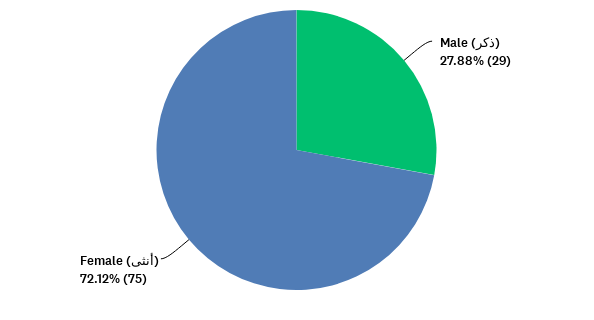
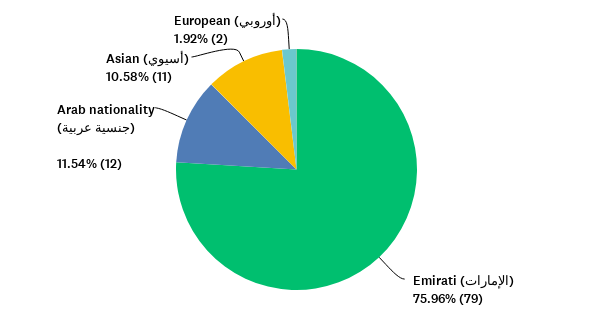
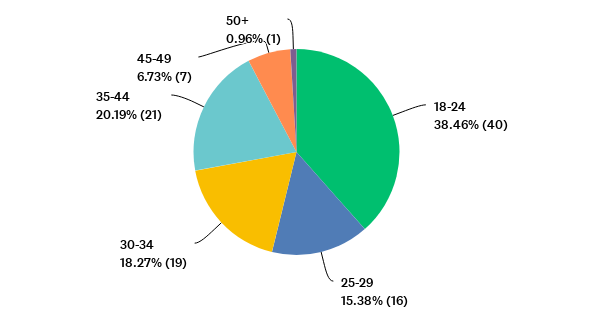
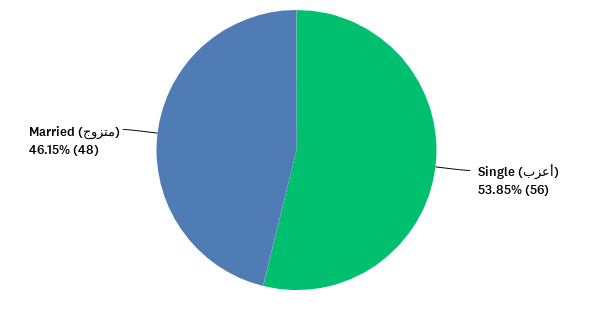
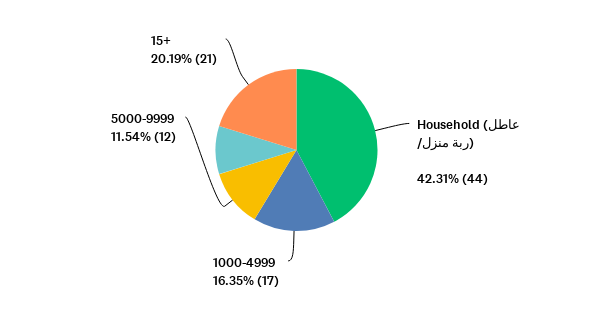
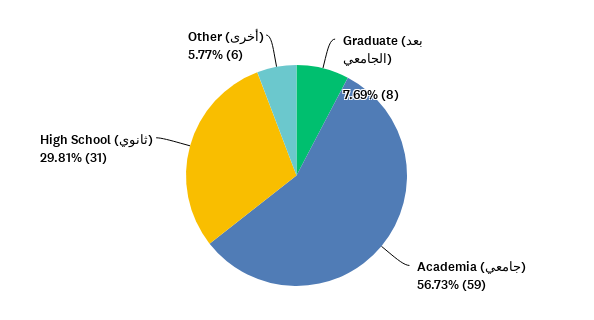
Fig. 1. Identities of Respondents
The participants were comprised of people from different nationalities, which was aimed at obtaining more accurate results. Of the total of 104 participants, 79 of them were Emiratis, the Arab Nationality was 12, Asians were 11, and Europeans were 2 participants. This is bases on the fact that people from different nationalities may have varied opinions toward traffic fines and penalties as outlined in the UAE. Social status was also important in this particular research. Of the total participants, 56 respondents were single, while 48 participants were married. Education level was also an important consideration in the study. Among the total participants, 8 of them were graduates, 59 were from Academia, high school respondents were 31, and 6 were among the other groups. The income level was also considered in the research, where households were 44 participants, those earning an income of 1000-4999 were 17 respondents. 5000-9999 were 12 participants, 10000-14999 were 10 participants, and lastly, those of 15+ were 21 participants.
Figure 1 above shows how the respondents were distributed in terms of their identities. The graph shows that the age bracket of 18-24 was the majority, which constituted 38.46% compared to the other age groups. Those individuals aged 30 years and older had a lower percentage. This means that the younger population suffers more from traffic fines and penalties. The figure above also shows the study sample in terms of gender which was used as a variable in this particular research. There is a substantial difference between the two genders where women comprise 72.12%, which is 75 in number, while men are 27.88%, which is 29 in number. There is no balance between the two groups involved in this research.
Summary of Respondents’ Views
Initially, the respondents were asked if they recall ever having to pay a fine for failure to follow the traffic rules. As revealed from the following Figure 2:
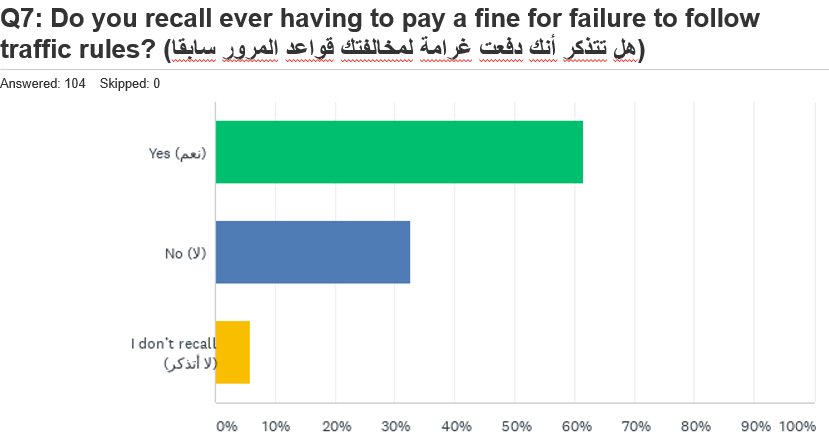
Figure 2 above shows that most of the population sample, 61.54% (64 respondents), recall the last time they paid for a traffic fine for failing to follow the traffic rules. Similarly, 32.69% indicated that they did not remember paying fines, while the rest had no information about their last time paying fines. A larger percentage indicated that they were not willing to repeat the same mistakes next time.
The respondents were then asked if the fines and penalties they suffered made them keener not to repeat the same mistakes. The answer presented in Figure 3 below revealed that 23 respondents (22.12%) were keener not to repeat the same mistakes, and 53 (50.96%) were not keen not to repeat the same mistakes again. The remaining 26.92% (28 participants) never recalled the last time they paid fines. Figure 3 below shows a summary of the respondents.
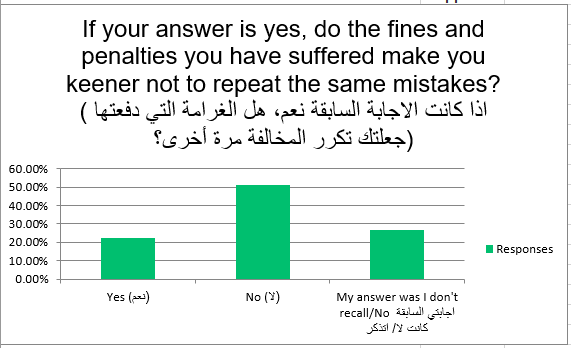
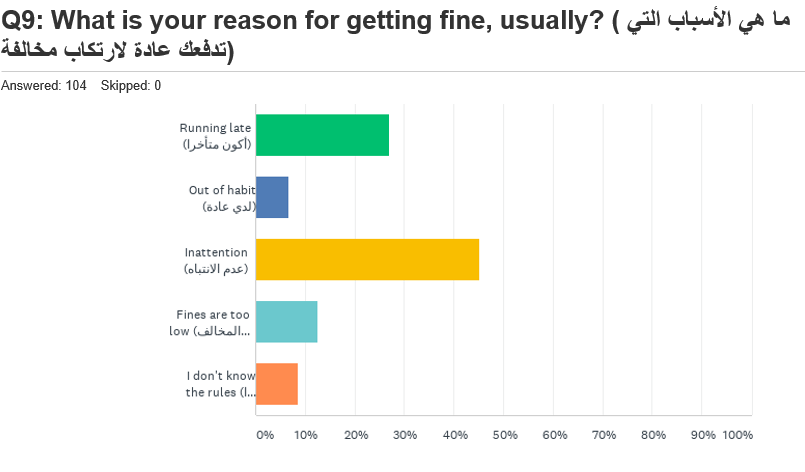
Figure 4 above is a representation of various reasons that the respondents gave for getting fined. Out of the total respondents, it is clear that a larger percentage of them were fined due to being inattentive, comprising 45.19% (47 respondents). Other significant results indicated that 26.92% (28 respondents) received fines because they ran late, whereas 12.50% said the penalties were too low.
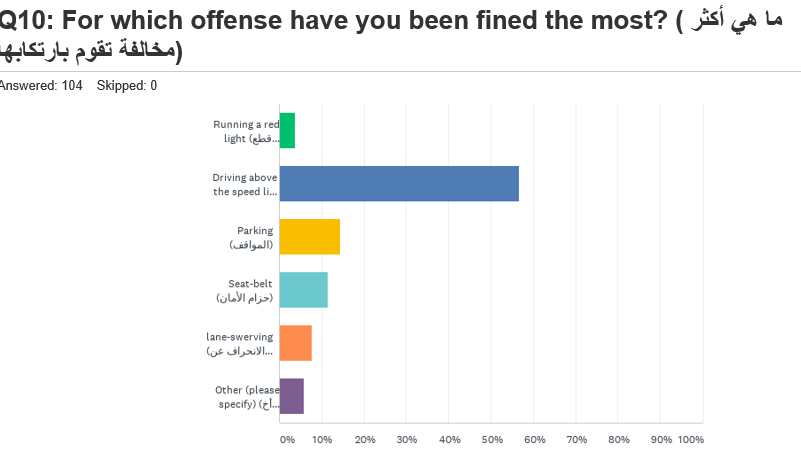
It was also important to note from the research about the offense where individuals were fined the most. Figure 5 above shows that many people faced fines for overspeeding, comprising 56.73% (59 respondents). Moreover, other significant offenses included parking, seatbelt, and lane-swerving.
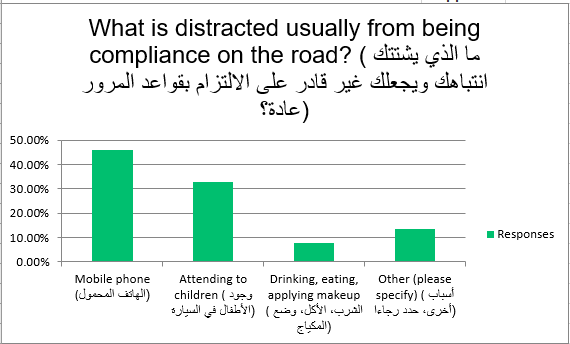
The respondents were asked what distracted them from being compliant on the road. From Figure 6 above, the majority of the respondents revealed that the mobile phone was the main cause of non-compliance on the roads, comprising 46.15% (48 participants). Thirty-four participants revealed that attending to children was the major cause of non-compliance on the roads, drinking, eating, and applying makeup comprised 7.69% and lastly, others took the rest 13.46% of respondents.
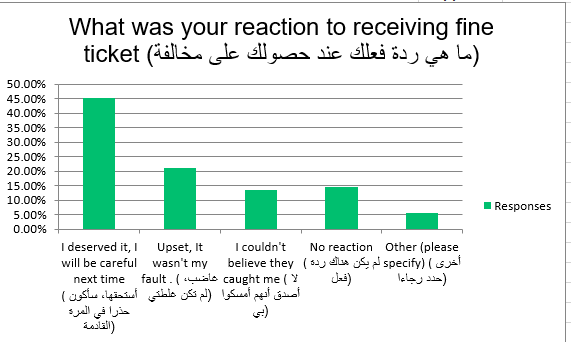
Another question that the respondents were asked was their reaction when they received the fine ticket. From the Figure 7 above, it was revealed that 45.19% of the individuals indicated that they deserved it, they will be careful next time. 21.15% said that they were upset, it was not their fault, 13.46% said that they never expected that they would be caught and lastly 14.42% had no reaction. The rest of the population, 5.77% had responses outside what was asked in the particular research.
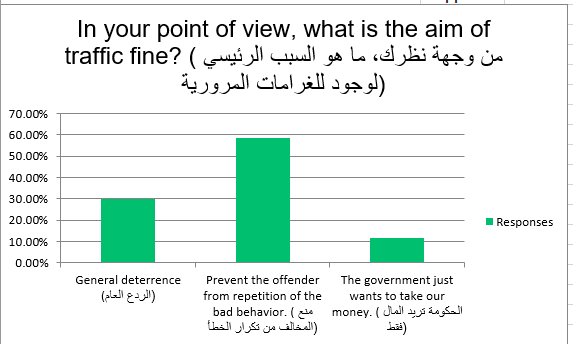
The respondents were asked to reveal the aim of the traffic fines. From the Figure 8 above, 29.81% indicated that the aim of traffic fine was general deterrence. 58.65% said that fines prevented the offender from the repetition of the bad behavior and lastly, 11.54% said that the aim of the traffic fines was a deal of the government to take their money.
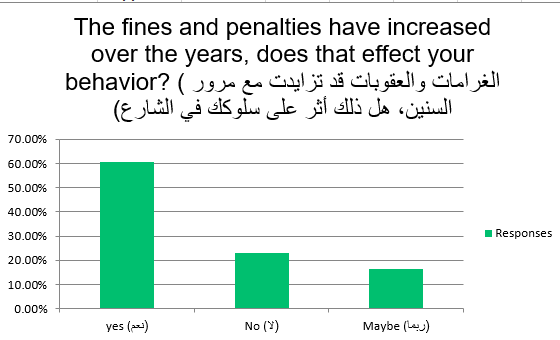
The other question of concern was how the increased penalties over the years had affected the questionees’ behavior. Of most of the respondents, 60.58% indicated that the increased fines had impacted their behavior, and 23.08% of them revealed that the increased penalties had not impacted their behavior.
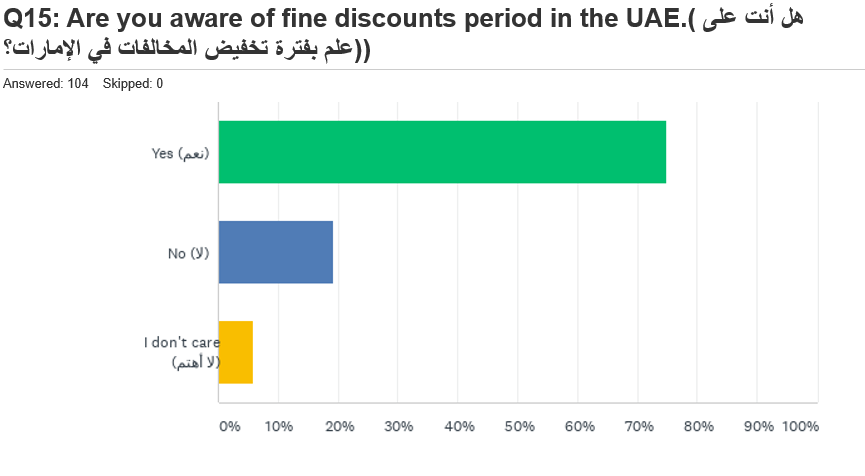
Figure 10 above shows the responses regarding the awareness of individuals about fine discounts in the UAE. It is clear from the results that most of them, 75.00% (78 respondents), is aware of the discount values. On the other hand, 19.23% of respondents are not familiar with the small discounts and the remaining percentage is not interested in discounts.
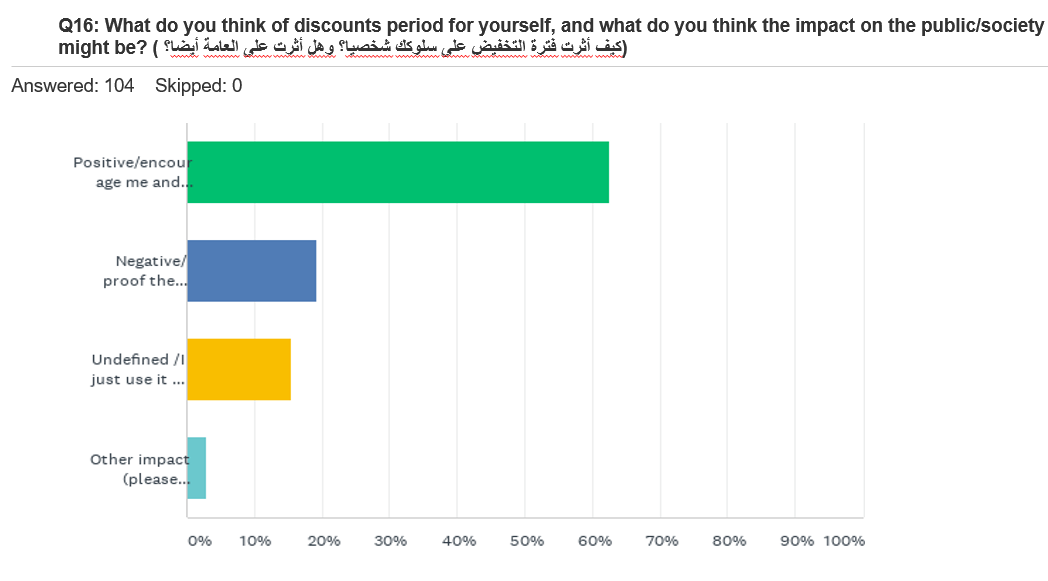
In addition, the respondents have shown noticeable approval of the idea of the discount season as the way of addressing the current standard for fines in the UAE. Due to the high threshold set for the present fines system, there is the need to shape the latter so that people would not be discouraged by the increasing fines. With the described system in place, most citizens are likely to be conformable with meeting the set requirements for safety.
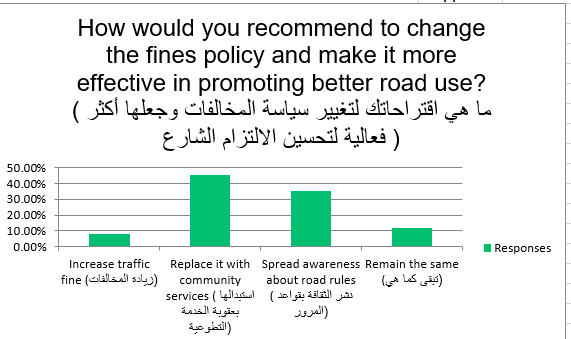
Respondents were asked to give their recommendations on what they would like to see in the traffic fines. Most of them revealed that traffic fines should be replaced with community services, where 45.19% agreed with this statement. Also, 35.58% of respondents revealed that the awareness of the rules among the road users should be increased.
Discussion
This study has involved respondents aged 18 to 50 years, where 18-24 years have the majority number, which is 38.46%. In this study, the major participants are females constituting 72.12% of the total sample population. Most of the respondents, that is 61.54%, recall having to pay a fine for failure to follow traffic rules, 50.96% articulate that the penalties they received did not make any changes. Similarly, 45.19% expressed that their main reason for getting fined was inattention, 56.73% said that they were fined for driving above the speed limits, 60.58% reported that the fines and penalties had improved their behavior.
Compliance on the roads is caused by various factors, as revealed from this particular research. A larger percentage of the respondents indicated that they use phones when driving. It means that they are not aware of using a phone while driving. Others indicate that they are bumped in by traffic officers when attending to children, another indication that they do not put into consideration the traffic rules.
Among the recommendations that were revealed from the respondents, it was clear that most of them advocated for community services. This means that the traffic rules are too harsh for them hence should be replaced. A significant percentage of them also indicated that awareness about road use should be increased. It implies that most road users do not have enough information about the existing fines that enhance safety. Hence, to better road safety services, the authorities should increase awareness of the traffic rules.
It is also crucial to note that most UAE citizens appear to be in favor of introducing a discount framework as a means of counterbalancing the current rigid system of fines. Since the present high rates for fines may reduce people’s motivation to learn about safe driving, the inclusion of options for saving money while still receiving a penalty will create premises for people to take safety issues seriously. Therefore, the results of the survey support the initial null hypothesis, which establishes that UAE citizens tend not to take safe driving seriously.
The findings from this particular research indicate that the null hypothesis (HO) is accurate. The people of the UAE who experience traffic fines and penalties are unlikely to abide by the traffic laws even if they know their consequences. Most of the respondents indicated that fines did not change their road behavior after receiving the fines. Similarly, some part of the survey supports H1 that the people of UAE who experience traffic fines and penalties are likely to abide by the laws as they know their consequences. In this regard, the information obtained in the course of the qualitative data collection has indicated that most people are familiar with the concept of a traffic fine, yet they rarely follow the rules that allow for avoiding it.
Implications and Limitations
This paper has collected substantial information about road users’ various opinions on traffic fines and penalties effectiveness in the UAE, identifying the country’s strengths in reducing road accidents. For instance, the research emphasizes establishing other regulations and measures to monitor traffic rather than using fines and penalties. However, there is a significant limitation that primarily focuses on individuals’ opinions as the only assessment used in evaluating traffic fines and penalties applied. In most cases, the respondents may have varying ideologies, hence not being completely honest. The other limitation is the type of method that was used in the collection of data. This research involved an online survey and only took a few individuals to represent the target demographic in this research. This limits the accuracy of the results because appropriate methods are not used. Most people are honest when interviews and other techniques that involve face-to-face data collection are administered.
Conclusion and Recommendation
To conclude, road safety is becoming a significant concern in most countries. It is one of the leading causes of death in most developing countries, and by 2030, the issue may be out of hand in such states. To establish a mitigation plan, the government and other relevant authorities found various regulations that every road user must follow. Traffic fines and penalties effectiveness have been a significant concern in the UAE. The efforts have been aimed to reduce the level of road accidents in the UAE. The regulations have been enacted to protect the road users against overspeeding, wearing seatbelts, and parking. In the UAE, most individuals are required to observe such rules. These are efforts that the government has made to reduce road fatalities. The penalties and traffic fines have raised many varying opinions from the public. Some of the people know about such regulations, while others ignore them. Similarly, people still commit some offenses knowing that the fines are too low for them. Therefore, the UAE government should consider establishing other vital measures to ensure that traffic incidences are being handled.
Based on the results that have been reached through this research of road users’ opinions in the Emirates, I recommend that the involved decision-makers consider various suggestions to improve the traffic fines and penalties effectiveness throughout the country. The first one is through behavior and education, where there should be an increased awareness of the traffic rules among road users. Most road users are aware of the laws, but they are not taking them seriously. Hence, they should be enlightened about the issue, and this can be done by doing road campaigns. Another recommendation is that there should be more laws guiding people about traffic safety. From the results, it is clear that most individuals are aware of the traffic fines, but they do not follow them. A new approach to traffic safety should be devised to enhance close monitoring of their conduct on roads.
Replacing the traffic rules with other punishments can be an effective recommendation in enhancing traffic safety. For instance, when one offense the traffic rules, they can be detained and given community services such as cleaning the cities. Most of them will fear repeating the same mistakes; they will consider it a heavy and odd punishment that they are not willing to do.
References
Alhmoudi, M., Abuzwidah, M., & Hamad, K. (2017). Road users’ opinion about pedestrian safety in the emirate of Sharjah, UAE-survey results. Web.
Chandrasekaran, L., Crookes, A., & Lansdown, T. C. (2019). Driver situation awareness–Investigating the effect of passenger experience.Transportation Research part F: Traffic Psychology and Behaviour, 61, 1-18. Web.
Elvik, R. (2016). A theoretical perspective on road safety communication campaigns. Accident Analysis & Prevention, 97, 292-297. Web.
Grivna, M., Eid, H. O., & Abu-Zidan, F. M. (2017). Youth traffic-related injuries: A prospective study.World Journal of Emergency Surgery, 12(1), 1-7. Web.
Harith, S. H., Mahmud, N., & Doulatabadi, M. (2019) A conceptual framework on the role of road safety management intervention in overcoming road accident. Proceedings of the International Conference on Industrial Engineering and Operations Management Bangkok, Thailand, March 5-7. Web.
Mohamed, M., & Bromfield, N. F. (2017). Attitudes, driving behavior, and accident involvement among young male drivers in Saudi Arabia. Transportation Research part F: Traffic Psychology and Behaviour, 47, 59-71. Web.
Shaaban, K. (2017). Assessment of drivers’ perceptions of various police enforcement strategies and associated penalties and rewards.Journal of Advanced Transportation, 2017, 1-15. Web.
Shults, R. A., Haegerich, T. M., Bhat, G., & Zhang, X. (2016). Teens and seat belt use: What makes them click? Journal of Safety Research, 57, 19-25. Web.
Zou, X., Yue, W. L., & Le Vu, H. (2018). Visualization and analysis of mapping knowledge domain of road safety studies. Accident Analysis & Prevention, 118, 131-145. Web.